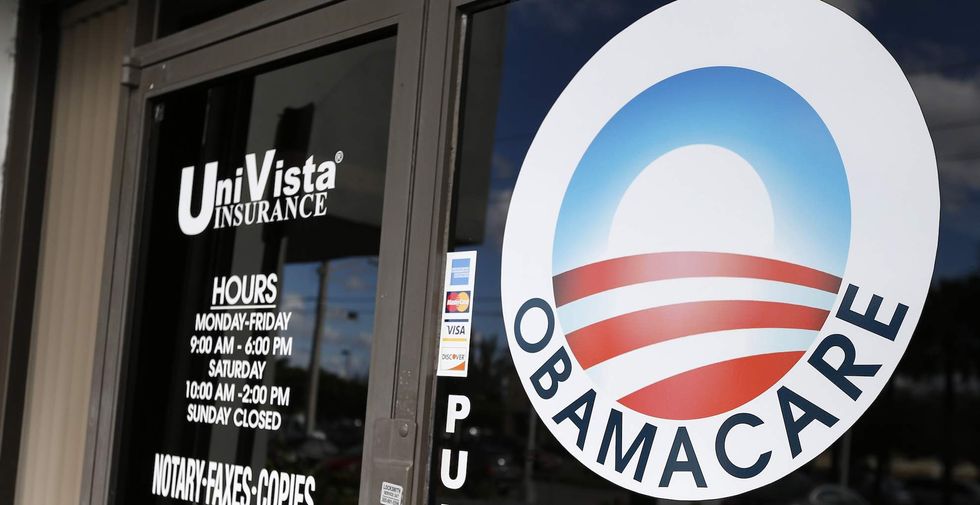
Rhona Wise/AFP/Getty Images

While Obamacare lingers as uncertainty about its future looms, enrollment numbers are dwindling and more insurers are looking for ways out of the controversial health care legislation.
According to a CNN poll from January, 55 percent of Americans want to see the Affordable Care Act — former President Barack Obama's signature legislation — repealed and replaced. Twenty-one percent favor a repeal even without a replacement plan, while 22 percent want to see repeal plans abandoned.
At the conclusion of the latest (and possibly final) enrollment period, the numbers aren't too great. With President Donald Trump slamming Obamacare and his White House pulling ads for the health care program reminding late-comers to sign up for coverage by the Jan. 31 deadline, roughly 9.2 million people signed up, according to CNN.
That number is down from 9.6 million a year ago, and in the final two weeks of enrollment, only 376,000 people signed up for coverage, compared to the nearly 700,000 who enrolled at the same time in 2016.
Four years ago, the nonpartisan Congressional Budget Office projected 201 million people would have private health insurance in any given month in 2016. But last year, the CBO found that, on average, only 177 million people had private coverage — a shortfall of 24 million. And in 2016, the CBO slashed its original forecast of 21 million new enrollees to 13 million.
And with already unimpressive numbers in 2017, Hot Air's John Sexton notes that it's likely to get worse:
[T]here is always a drop off between the number of people who sign up and the number who actually maintain their insurance throughout the year. So expect the actual number of people enrolled by the end of this year to be 10-15% below whatever finally tally is announced next month.
All of this follows the Obama administration's abysmal October report, which found that Obamacare premiums would increase by double digits in 2017.
Health care providers such as Aetna, UnitedHealth Group and Humana have already widely scaled back their participation in the exchanges on healthcare.gov, and according to Bloomberg, that trend is expected to continue.
Mark Bertolini, Aetna's chief executive officer, said last week that the health insurance company would not sell plans in states where it has already pulled out and signaled that it may continue shrinking its participation "given the unclear nature of where regulation’s headed."
Anthem, Inc., said that, though its participation in Obamacare is stabilizing, it is uncertain how long it plans to remain part of the system.
"We will make the right decisions to protect the business," Anthem CEO Joseph Swedish told Wall Street analysts on a conference call, Bloomberg reported. "If we can’t see stability going into 2018, with respect to either pricing, product, or the overall rules of engagement, then we will begin making some very conscious decisions with respect to extracting ourselves."
In the first day of his presidency, Trump, who vowed last month to provide "insurance for everybody" with the Republican replacement plan, signed an executive order to "ease the burden of Obamacare."
The intent of the order is to make clear Trump's full intention to seek a repeal of the Affordable Care Act and, in the meantime, take steps "to minimize the unwarranted economic and regulatory burdens of the Act, and prepare to afford the States more flexibility and control to create a more free and open healthcare market."
All of this creates more uncertainty for insurance providers already uneasy with the controversial health care legislation. Some congressional Republicans, according to The Hill, are shifting the conversation from repealing Obamacare to instead repairing the bill.
"I'm trying to be accurate on this that there are some of these provisions in the law that probably will stay, or we may modify them, but we're going to fix things, we're going to repair things," Rep. Greg Walden (R-Ore.), who chairs the House Energy and Commerce Committee, told reporters last week. "There are things we can build on and repair, there are things we can completely repeal."
But there is certainly not unity around that approach. House Speaker Paul Ryan (R-Wis.) said Sunday that Republicans still plan to fully "repeal and replace" Obamacare.
"If you're going to repair the American health care system and fix its problems, you have to repeal Obamacare and replace it with something better: patient-centered health care," the top Republican told NBC News' "Meet the Press" host Chuck Todd. "And that is how you repair this health care system."
"Somewhere along the line, there was confusion that we were going to take the Obamacare architecture and, you know, tinker at the margins and repair it," Ryan added. "You can't. It is a collapsing law."
While Republicans have myriad plans to replace Obamacare, Trump told the New York Times last month that he wants to see the health care bill replaced with a GOP-led plan "very quickly or simultaneously, very shortly thereafter."
However, during a sit-down with Fox News' Bill O'Reilly that aired Sunday, the president said replacing Obamacare is "complicated" and may take some time.
"Maybe it’ll take till sometime into next year, but we’re certainly going to be in the process," he said, adding, "We’re going to be putting it in fairly soon, I think that, yes, I would like to say by the end of the year at least the rudiments but we should have something within the year and the following year."